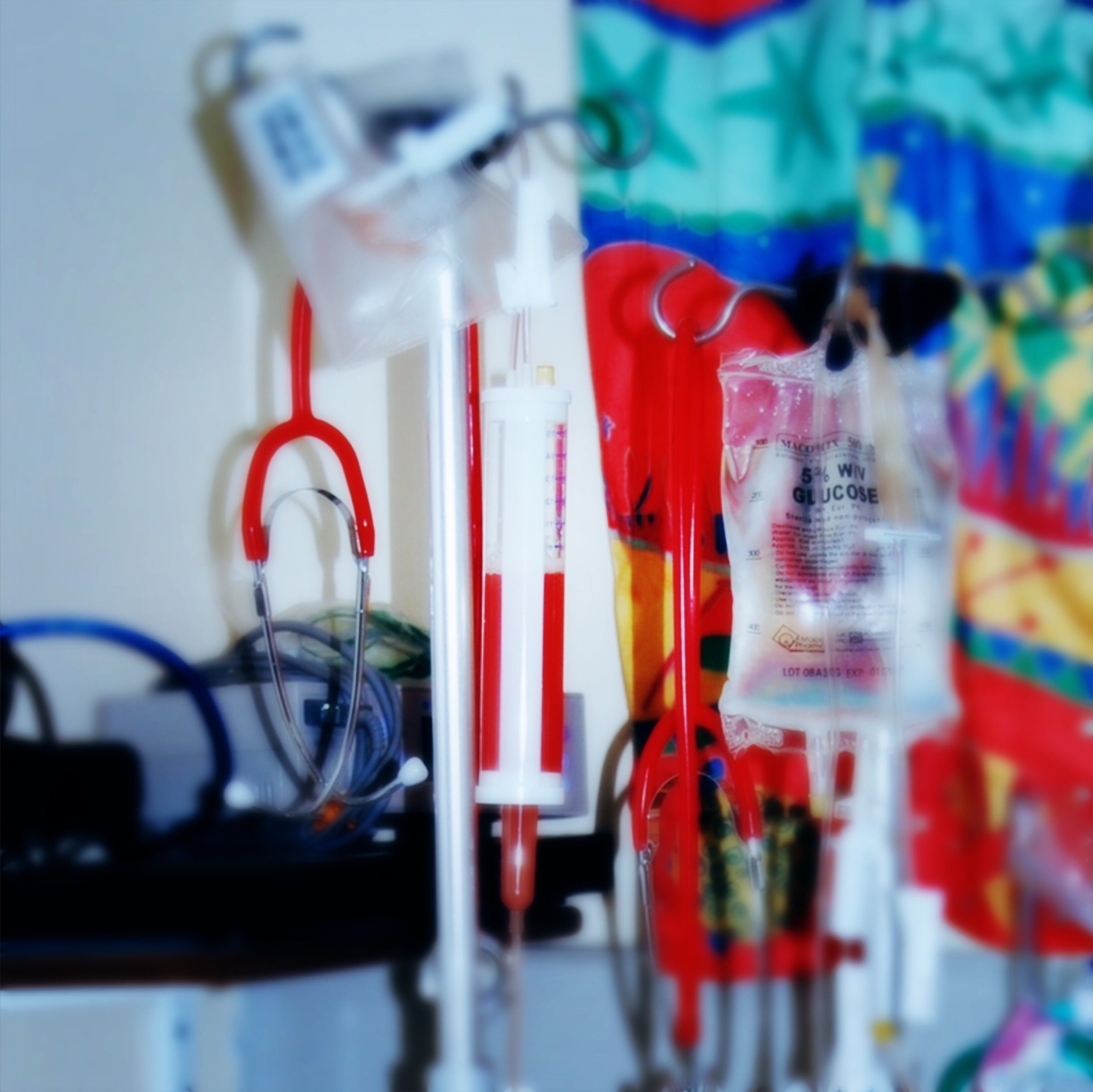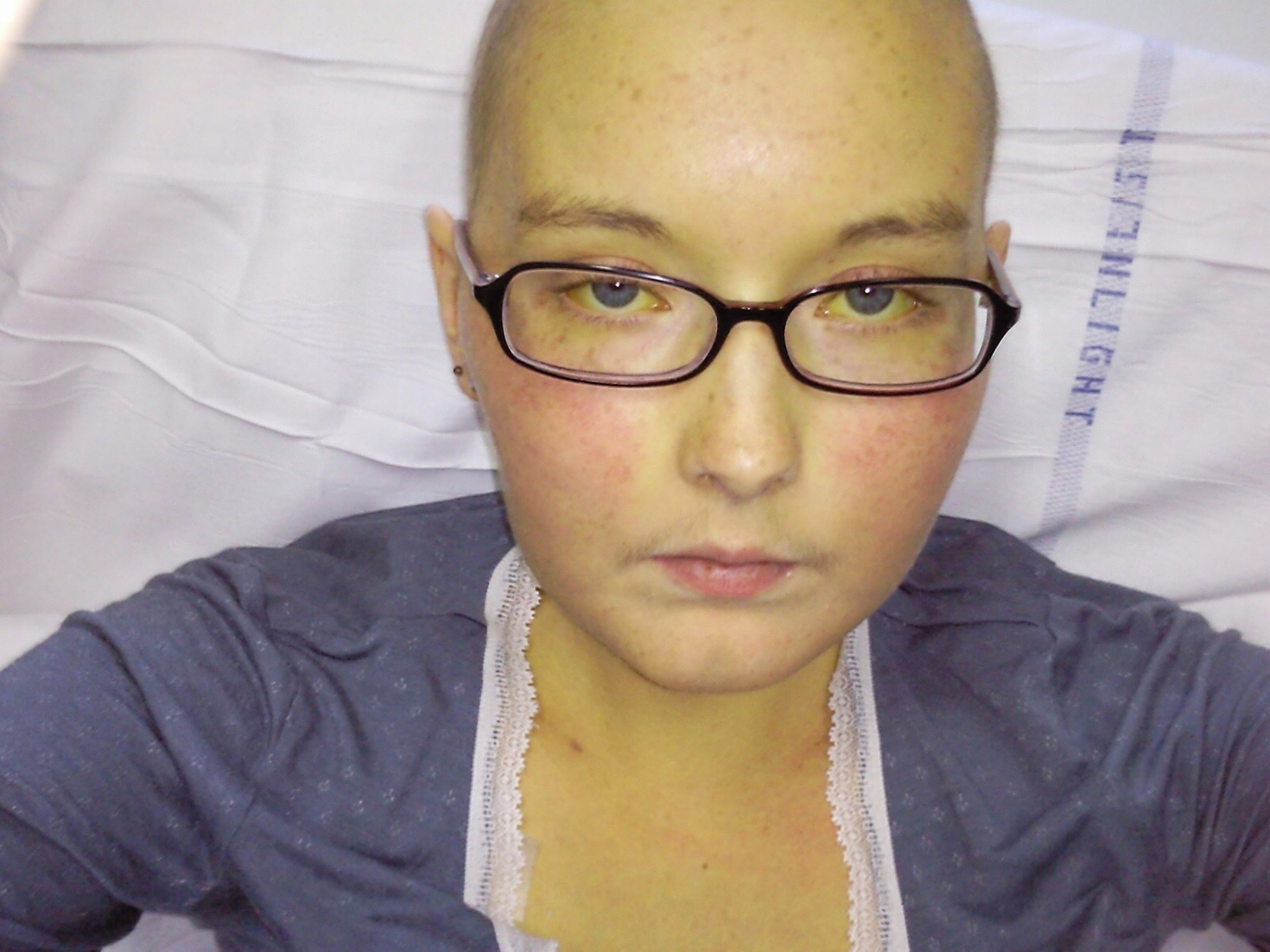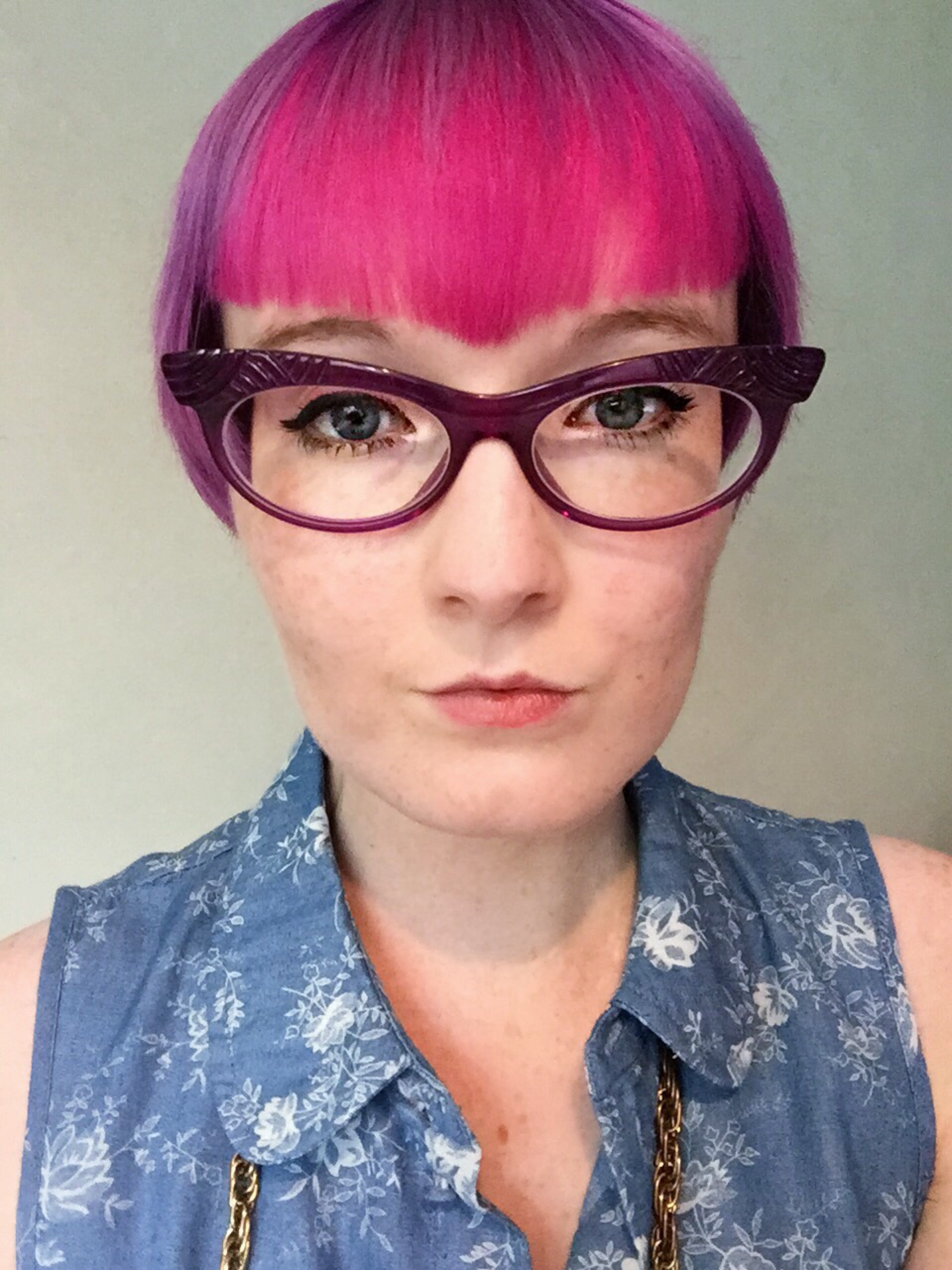It's my 8th Marrowversary today. Now patients who deserve to live won't even get one. Fix it, Jeremy.
 A bag of cells. That's all it is. Just a bag of cells from a stranger. But eight years ago today, a bag of cells changed my entire life. I had Acute Myeloid Leukaemia M7 monosomy 7 for the second time and the prognosis was not good. I'd had one stem cell transplant from my sister, but she was too good of a match and just settled right in without a fight. You want a bit of a struggle, to get rid of any lurking leukaemia. For all the battles we had growing up, you'd think our DNA might clash, but we're obviously more similar than we thought. Not a hint of graft versus host disease, and so the sneaky, silent killer oozed back into my bloodstream, making itself apparent by forming tumours in my face.
A bag of cells. That's all it is. Just a bag of cells from a stranger. But eight years ago today, a bag of cells changed my entire life. I had Acute Myeloid Leukaemia M7 monosomy 7 for the second time and the prognosis was not good. I'd had one stem cell transplant from my sister, but she was too good of a match and just settled right in without a fight. You want a bit of a struggle, to get rid of any lurking leukaemia. For all the battles we had growing up, you'd think our DNA might clash, but we're obviously more similar than we thought. Not a hint of graft versus host disease, and so the sneaky, silent killer oozed back into my bloodstream, making itself apparent by forming tumours in my face.
"What are my chances?"
"Not good."
"No, I need numbers, Mark."
"Maybe twenty percent?"
I gave up. I didn't want to try. Go through it all again, but multiplied by 100. Harsher chemo, radiotherapy, and four out of five doors leading to the abyss. I couldn't envision myself being lucky enough to pick the right one, so I surrendered.
I went to my school to tell the only other people who needed to know - my friends. For some reason, and I still have no idea why I chose to do this, but first, I knocked on the door of the headmistress' office. I didn't know if she was there, if she was busy, I just had to talk to her. I sat there on the sofa in my vest, grey hoodie and grey jeans with my number 1 crew cut, and told her that I just couldn't do it. I am welling up as I write this; I have not put myself back in that moment for so long.
We did not get along while I was a pupil. Suspended twice, forever in trouble and would always try to find a way to talk myself out of it. That's probably why she wouldn't accept my resignation.
"Do you feel like the fight has gone?"
I nodded. I couldn't form the word.
"That is not the Kathryn I know."
I knew that she was right. I am not the sort of person who gives up easily. I have since proved it, again and again. I give that woman an amount of credit equivalent to my doctors because she made me realise that I needed to try to live. Seventeen did not have to be the end for me. One in five survive. Why shouldn't it be me?
I am still a realist. I told everyone that despite the best efforts of modern medicine, the most likely outcome was going to be my funeral. There were floods of tears.
"What are you girls doing, all moping about on the floor?"
"Well, I'm probably going to die and we're kind of upset about it, if you don't mind."
The Kathryn I couldn't find was back. As heavy as the spectre of death weighed upon me, I told my doctors that I wanted to start chemo. We were going on a quest to find the donor, and save the girl.
The rigmarole began. Drugs, infections, temperatures. Nosebleeds, anaphylaxis, haemorrhoids. Radiotherapy, exhaustion, death. Only my own in my head, cured by a pint of Ben & Jerry's, but on a cancer ward you can't be around for too long without losing some souls for whom you've grown to care. You're not allowed to forget.
Fast forward to transplant day. Locating a donor proved to be troublesome; a good match was found in Germany, but was unavailable when he was needed. I hope it was something vital that he couldn't get out of, like getting married, not just watching the very important German football match that also happened to be occurring that day. Now there was a panic, I admit, and it seemed that a haploidentical transplant using my father as my donor might be our only hope.
But what light through yonder window breaks? Another German match, just a year older than me, and ready and willing to give his time and stem cells in order to give hope to a stranger.
They arrive in a container filled with liquid nitrogen, and the nurses in their rubber gloves and goggles lay them in a water bath to thaw before attaching them to my dripstand. The tubes are connected, the flow rate is programmed in, and it begins. Slowly they tick through, gingerly entering my bloodstream, searching for the empty bone marrow where they might make their home. I am hoping there is still an unwelcome squatter there for them to have to get rid of first. Just a casual altercation, nothing too dramatic, then I can get on with my life. Grade 1 Graft versus Host Disease would be ideal.
Be careful what you wish for. A minor fracas of a slight skin rash turned into an all-out war, and the collateral damage was my stomach. The entire lining of it was destroyed, leaving me without the enzymes to digest anything and an immediate future of tubes being forced up my nose and down my throat like they do to prisoners on hunger strike in Guantanamo Bay, alongside IV nutrition that would give me temporary diabetes. However, that would heal. It would take months to be able to eat and drink even the simplest of things without vomiting, and over a year to be free of assistance and rely purely on the food I could eat myself for sustenance.
For all that, the real casualty was my liver. More specifically, my bile ducts. They couldn't cope and simply shrivelled up, leaving the bile with nowhere to drain out. It built up and up, eventually leaking out into every vessel it could find, turning my eyes and skin green with jaundice and poisoning me from within. Nothing I said really made sense, the toxicity diseasing my brain. I needed a new liver.

The beginning of advent marked the start of our wait for a liver donor. Unlike a stem cell transplant, there isn't a register of people to search through, to find the one you need and just ask them to take part in an easy procedure that could cure someone's disease.
With a liver, most of the time, somebody has to die, and with every calendar door that opened, it was looking more and more like that person was going to be me.
I was not expected to see the Christmas of 2008. With four days to go, the 21st, we got the call. Doctors rushed in with forms, and nurses took more blood than they ever had before, with even them not knowing what they were all for. We were not fussed; we knew it wouldn't necessarily go ahead, not until the surgeons had seen the organ and deemed it okay to use. This made it all the more surprising when I was suddenly being taken to surgery and falling into a propofol-induced sleep. The liver was good.
I woke up two days later in ITU, intubated, and with a baby next to me with an open chest. It was the middle of the night, but I was desperate to brush my teeth. I was given the tools, but warned not to swallow any water. My fluids were severely restricted: 10mls an hour. I sucked pink sponges on toothpicks. The miniscule plumbing that had been done on my ducts and vessels couldn't afford to be stressed by large amounts of work to do when they were still so new and fragile. I asked the nurses to bring me a TV and I watched Jack Frost on video until my family came.
I was transferred to the liver ward, where we spent that Christmas. My friend brought me a bag of satsumas and clementines, which I segmented and practically inhaled the juice from each slice, spitting the flesh into a sick bowl. I just needed to taste something. Once normal amounts of fluids were permitted, it seemed the only thing I didn't find completely arduous to drink was warm Ribena. I chewed on Calippos, biting them through the side of my mouth like I was Bugs Bunny. I couldn't explain why, it was just what I needed.
It was hard. Probably the hardest thing I have ever done. I had no muscle mass from being in bed for so long; lifting my own head was impossible, let alone rolling over or sitting up. I had no independence. Even toileting required more assistance than any seventeen year old wants to ask for. I felt like a burden. Add to that the bedsores, the oedema in my lower legs which would not go away no matter how many pillows I put them up on, and the fact that I was still vomiting up chunks of dead tissue from my diseased stomach, I really lost any will to live I had had before. I was so depressed, I could not speak. I would not communicate with the doctors or nurses. I hated them, I hated my room, an unfinished zoo mural that the other children were too afraid of to sleep in, and I just wanted to go back to the haematology ward, where I knew it would be better. As soon as it became apparent my liver was doing fine, they let me go.
Behind all this, there were things going on inside my body that no one knew about, or understood when they did. Some stem cells that had come with the liver had decided they would go on a trip around their new home. They came across my bone marrow, and liked it enough to want to stay. Both the German and the liver donor couldn't live together in harmony though, and one had to go. The liver donor was strong. She committed her troops to the conquest and by mid-January, there was no trace of the German DNA and I'd been colonised by this new girl. This was not supposed to happen. It has never happened before or since. Nobody has had an accidental, complete stem cell transplant from an organ and survived. If there is any stem cell migration, graft versus host disease usually occurs to a fatal degree, which I have seen only too close up.
Of course, I got some more graft versus host disease with the accidental transplant. This time in my lungs. It didn't help with learning to walk again, getting breathless by the time I'd got to the end of my bed, but I got there. I started being able to digest very basic foodstuffs. It took six months for me to be discharged, and of course that was not the end.
My liver is not perfect. Malfunctioning sphincters in my bile ducts are causing bile to build up again. Now it makes biliary stones, which cause the sort of pain that makes me scream involuntarily and is only dulled by IV morphine, or it just festers, creating stagnant pools in which bugs thrive and grow into infections that nearly kill me, like the klebsiella I had in 2013. I had sepsis and the antibiotics were having a hard time beating it. We were told that this infection would come back, they might not be able to treat it next time, and then I would die. The only way to stop that from happening was another liver transplant, but my lung doctor had a secret spanner to put in the works. The damage done to my lungs by the graft versus host disease means that even if I had the operation, my lungs would not be able to support me off the ventilator. I would never come off life support. They could not fix me. Next time it comes back might be the last time.
That is my life since my second transplant. It is difficult. I use a wheelchair outside of the house unless walking is going to be minimal. I am infertile and permanently single because nobody swipes right for this amount of work at my age. Something frightening is going on in my back that requires me to see a spinal neurosurgeon. I had an eating disorder that took me to a dangerous weight and nearly sabotaged everything I worked so hard for. I am unemployable. I have depression that I have medication for but still sometimes the heavy cloud descends and nothing I can do will shift it until the breeze moves it along. Sometimes it is days, sometimes it is months. Sometimes I wonder what I did it for, when I feel like I have no purpose.
But I do. To make the best of my life is my purpose. I was given this opportunity, miraculously, and I have to seize it. And I have. I have seen Paris in the rain, and sunset over Lyme Bay. I walked the red carpet of a Hunger Games premiere and got to see the Royal Courts of Justice dressed up like we were in the Capitol. I have friends all over the world. I make stuffed creatures that bring people joy. I have been drawn by my favourite illustrator. I have seen my friends' children born and I'm watching them grow into tiny people. I have celebrated birthdays nobody thought I would see. I think I have made a difference to people's lives. Maybe I've even saved one or two, indirectly. And now I have another purpose. I work with Anthony Nolan, being a Young Ambassador for them, and it means I get to tell everybody has what happened to me and show them that what we do is worthy. It is crucial. I am living proof that second transplants work and are not just a waste of funds (like some other things I could mention). In fact, they're essentially cost-neutral, compared to the life-prolonging chemo and palliative care required for those sent into no man's land. Those deemed not worth trying to save.
I am an anomaly. Unique. Whatever you want to call it. Had we not found a liver in time, had I not survived the accidental DNA change (which by all understanding I shouldn't have) then I would be another statistic to be used to show the second transplants aren't a good use of money. If the current rules were in place eight years ago, when (may I remind you) we were in far worse economic times, I would have been sent home to die at seventeen lest my doctors were able to argue that I was exceptional. I am, but they didn't know that then.
Nobody knows what's going to happen.
The statistics that would really show the success of second transplants in the UK don't exist because so few are done and refusing to do more is a) nonsensical and b) a huge slap in the face for all the people working tirelessly to save people like me. Who knows what we transplant patients might go on to do? Twenty percent is not terrible odds. We treat diseases with much lower chances of survival, yet this group of 20-30 people per year have been judged unworthy. Everyone deserves a chance, or at least the choice to take it. It should not be routine that anyone unlucky enough to relapse within a year is written off. It is inhumane. And my argument is that most cancer patients tend to embrace life afterwards. We give back. We make the world a better place. And retracting even the hope of survival from us and our families is simply barbaric. I accept that now I cannot be saved. There will be a point at which the bugs get me. But I am not being denied a treatment that works because a panel of people decided that I don't matter. And I will spend the rest of my life, however long it may be, fighting tooth and nail to get this decision reversed, and when it is, working with Anthony Nolan to save as many people as possible, informing people about becoming a stem cell donor and making the most of the marvel that is being alive. Do the right thing, Jeremy. We don't deserve to die.





